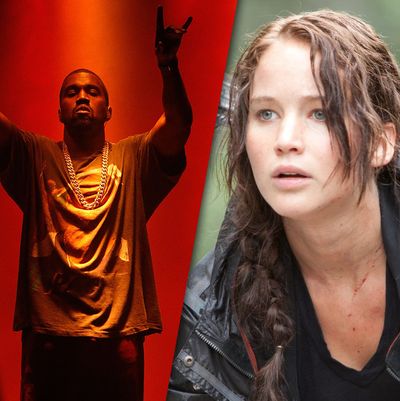
As America flirts with an autocratic future, can we ever look at the Kardashians the same way again? Pop culture rarely conforms precisely to political norms, but it’s safe to say that the cultural output of the Obama years assumed that we would be secure in our social-media-driven narcissism, ever-metastasizing celebrity obsessions, and twee hipsterism. It may explain why pop culture, absent an authority figure to grind against like a petulant teen, seemed both pleasant … and small.
Now we have not only our first reality-TV president but one who seems likely to govern as if the world were a single great reality show to be produced, with plot twists coming daily: Hamilton tweets. An Apprentice-style smackdown with TV-news executives. Bitch, I didn’t come here to make friends! It is leadership by pseudo-narrative.
So how will the TV that isn’t news react? Television is the most culturally responsive medium of the moment, and in the latter Obama years it seemed to anticipate what was coming better than did many of its viewers. The consistently delightful Black-ish, conceived in a time when its creators, and many of us, thought they were entering a post-racial society, quickly jogged left to deal with a nation that seemed to tolerate indiscriminate killings of black men and women by police officers. Transparent, the best half-hour comedy of our generation, and a standard-bearer for the recent trend of Comedy That Isn’t Funny, ping-ponged between modern-day Los Angeles and ’30s Berlin, arguing for the ability of a very specific kind of Jewish humor (much as it did in Weimar Germany) to tackle the historical outsider’s struggle for identity and belonging in an uncertain time.
The film business, when it strives for relevance, tends toward hackneyed, overly on-the-nose issue films (Crash, Birth of a Nation) and, stuck in its own cycle of decline, lacks the luxury of the sort of subtlety that has reinvigorated TV. But the most successful young-adult-film franchises of the past eight years have been notably prescient, particularly the Hunger Games films, which arguably could have served as potent narratives for both Bernie-ites and Trumpians. La La Land is an exercise in winking nostalgia, an argument for the innocence and decorum we have now most definitively lost. Will the Trump era bring us more PG-rated neo-traditionalism or a return to the urgent, brilliant, paranoid filmmaking of the ’70s: The Conversation, Three Days of the Condor, etc.?
In music, Kanye West seems to be suicide-bombing his career right on schedule, ushering hip-hop’s narcissistic, entitled Watch the Throne era out with it. Cue instead the increasingly militant Beyoncé, Kendrick, YG (whose “Fuck Donald Trump,” blasting from two stretch low-rider convertibles on West 4th Street on a recent morning, made my day), J. Cole (who may now finally have his chance to inherit the Kanye mantle), and particularly A Tribe Called Quest, which has its first-ever No. 1 album after more than three decades. The album’s first single, “We the People,” is an insinuating statement of righteous outrage that harks back to Sly and the Family Stone by way of Public Enemy.
Especially for younger people, the idea of pop culture as an oppositional force seems almost alien in an era dominated by the brush-off-your-shoulders cool of President Obama and his fanboy-pleasing alt-hip-hop playlists. The last time around, under President Bush, mainstream culture had not yet fragmented enough to open up opportunities for auteur-driven culturally rich output (for most of this time, The Sopranos and The Wire were the only series to reach for some of that jagged ’70s spirit), and, thanks to the all-obliterating impact of 9/11, the creative class seemed too cowed to confront 43 until the rest of the nation had already turned on him.
American pop culture was birthed as a rebellion against conformity and the oppressive whiteness of suburban adult life, a point that has mostly been forgotten as cultural output has increasingly become productized. The real anarchy is now online, in meme production, Reddit, Twitter, 4Chan, and their ilk, virtual back alleys that fuel the neo-fascist performance art of Steve Bannon and Milo Yiannopoulos … and the chaos presidency of Donald Trump. The opportunity, and challenge, for the creative class is to answer this “art” with its own and figure out a way to make it matter again.
*This article appears in the November 28, 2016, issue of New York Magazine.




